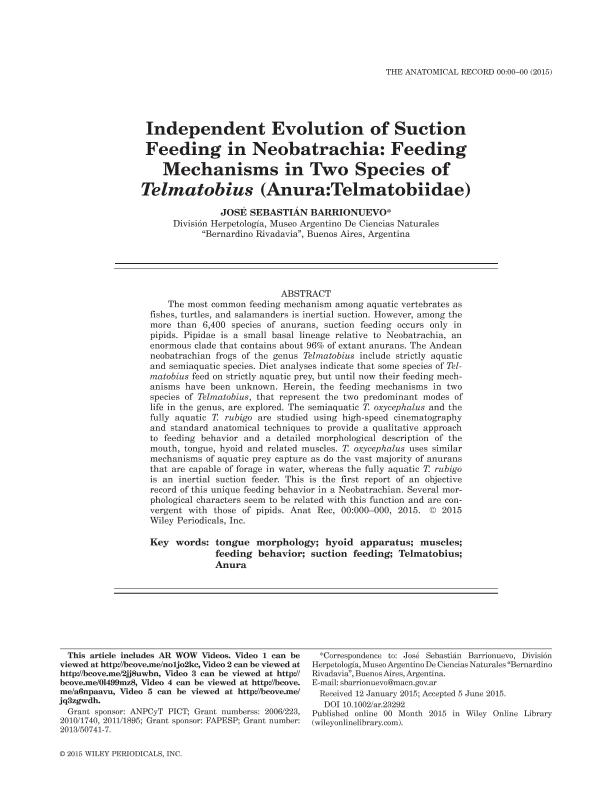Mostrar el registro sencillo del ítem
dc.contributor.author
Barrionuevo, Jose Sebastian

dc.date.available
2018-05-28T22:04:06Z
dc.date.issued
2016-02
dc.identifier.citation
Barrionuevo, Jose Sebastian; Independent Evolution of Suction Feeding in Neobatrachia: Feeding Mechanisms in Two Species of Telmatobius (Anura:Telmatobiidae); Wiley-liss, Div John Wiley & Sons Inc; Anatomical Record-Advances in Integrative Anatomy and Evolutionary Biology; 299; 2; 2-2016; 181-196
dc.identifier.issn
1932-8494
dc.identifier.uri
http://hdl.handle.net/11336/46379
dc.description.abstract
The most common feeding mechanism among aquatic vertebrates as fishes, turtles, and salamanders is inertial suction. However, among the more than 6,400 species of anurans, suction feeding occurs only in pipids. Pipidae is a small basal lineage relative to Neobatrachia, an enormous clade that contains about 96% of extant anurans. The Andean neobatrachian frogs of the genus Telmatobius include strictly aquatic and semiaquatic species. Diet analyses indicate that some species of Telmatobius feed on strictly aquatic prey, but until now their feeding mechanisms have been unknown. Herein, the feeding mechanisms in two species of Telmatobius, that represent the two predominant modes of life in the genus, are explored. The semiaquatic T. oxycephalus and the fully aquatic T. rubigo are studied using high-speed cinematography and standard anatomical techniques to provide a qualitative approach to feeding behavior and a detailed morphological description of the mouth, tongue, hyoid and related muscles. T. oxycephalus uses similar mechanisms of aquatic prey capture as do the vast majority of anurans that are capable of forage in water, whereas the fully aquatic T. rubigo is an inertial suction feeder. This is the first report of an objective record of this unique feeding behavior in a Neobatrachian. Several morphological characters seem to be related with this function and are convergent with those of pipids.
dc.format
application/pdf
dc.language.iso
eng
dc.publisher
Wiley-liss, Div John Wiley & Sons Inc

dc.rights
info:eu-repo/semantics/openAccess
dc.rights.uri
https://creativecommons.org/licenses/by-nc-sa/2.5/ar/
dc.subject
Tongue Morphology
dc.subject
Hyoid Apparatus
dc.subject
Suction Feeding
dc.subject
Telmatobius
dc.subject
Muscles
dc.subject
Anura
dc.subject.classification
Otras Ciencias Biológicas

dc.subject.classification
Ciencias Biológicas

dc.subject.classification
CIENCIAS NATURALES Y EXACTAS

dc.title
Independent Evolution of Suction Feeding in Neobatrachia: Feeding Mechanisms in Two Species of Telmatobius (Anura:Telmatobiidae)
dc.type
info:eu-repo/semantics/article
dc.type
info:ar-repo/semantics/artículo
dc.type
info:eu-repo/semantics/publishedVersion
dc.date.updated
2018-05-24T14:24:01Z
dc.identifier.eissn
1932-8486,
dc.journal.volume
299
dc.journal.number
2
dc.journal.pagination
181-196
dc.journal.pais
Estados Unidos

dc.journal.ciudad
Nueva York
dc.description.fil
Fil: Barrionuevo, Jose Sebastian. Consejo Nacional de Investigaciones Científicas y Técnicas. Oficina de Coordinación Administrativa Parque Centenario. Museo Argentino de Ciencias Naturales "Bernardino Rivadavia"; Argentina
dc.journal.title
Anatomical Record-Advances in Integrative Anatomy and Evolutionary Biology

dc.relation.alternativeid
info:eu-repo/semantics/altIdentifier/url/https://onlinelibrary.wiley.com/doi/pdf/10.1002/ar.23292
dc.relation.alternativeid
info:eu-repo/semantics/altIdentifier/doi/http://dx.doi.org/10.1002/ar.23292
Archivos asociados
